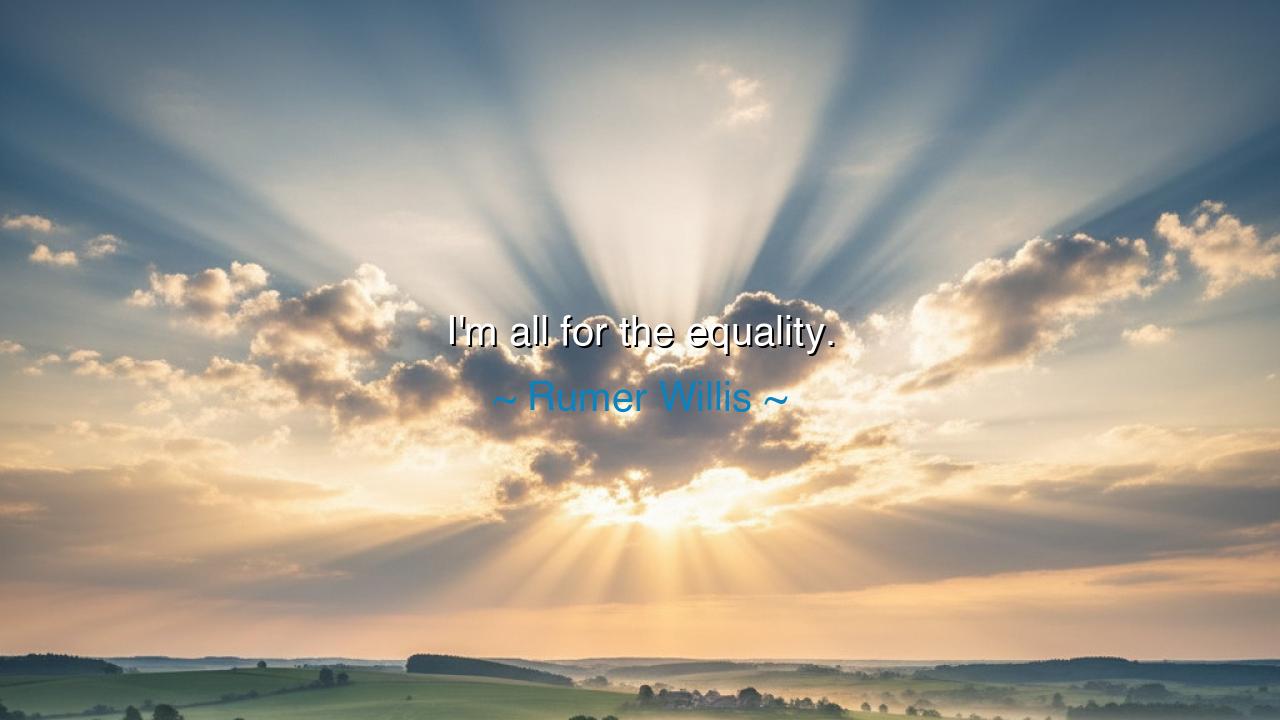
I'm all for the equality.






"I'm all for the equality." These simple words, spoken by Rumer Willis, carry with them a profound truth—a truth that has echoed through the ages and that has been the very heartbeat of humanity’s most noble struggles. Equality is not just a lofty ideal, but a foundation upon which the very essence of a just and thriving society is built. In these few words, Willis cuts through the complex debates and the layers of rhetoric to affirm a truth that should be self-evident to all: equality—in race, gender, creed, and status—is not just something we should strive for, it is something we must embrace if we are to truly live in harmony with our fellow beings.
In the ancient world, the idea of equality was often a matter of debate, with philosophers like Plato and Aristotle wrestling with the concept of what it means for all people to be treated justly. Plato, in his vision of an ideal society, argued that all people should be assigned roles based on their abilities rather than their birth, a notion that foreshadowed the ideas of meritocracy and equality in modern society. Yet, even in his ideal state, the ideal of full equality was limited, as women and slaves were still not considered equal to men in their capacity to contribute to society. Aristotle, in his work, often spoke of the natural order, which placed men above women and free people above slaves, perpetuating a hierarchy that denied many the inherent dignity and freedom that should have been theirs by right.
The wisdom of these ancient thinkers, while still valuable, must be viewed through the lens of progress—for over the centuries, the ideals of equality have evolved. Take, for example, the monumental struggle for racial equality led by figures such as Frederick Douglass, Harriet Tubman, and Martin Luther King Jr., whose fierce commitment to justice and freedom for all people forced society to confront its own prejudices and injustices. Douglass, having been born into slavery, fought not only for his own freedom but for the equality of all African Americans, articulating a vision of a nation where every person, regardless of their race, could live in dignity. King, whose "I Have a Dream" speech remains a defining moment in the fight for racial equality, spoke of a future where people would be judged by the content of their character and not the color of their skin. In their struggles, they embodied the essence of equality—a force that is meant to liberate, to uplift, and to connect all people in a shared destiny.
Yet, as Rumer Willis’s simple declaration suggests, the pursuit of equality is not confined to the pages of history. It is an ongoing struggle—one that continues to shape the lives of those who fight for the rights of women, the LGBTQ+ community, immigrants, and the marginalized. The #MeToo movement, for example, has brought the issue of gender equality to the forefront, challenging long-held norms around power and sexual harassment. It has forced us to confront the inequality that still persists in the world and has sparked a global conversation about the need for change. The struggles of the past have not been in vain, but there is still much work to be done.
Consider the courage of Malala Yousafzai, who, despite being shot for advocating girls' education in Pakistan, continued her fight for the equality of girls to receive an education. Her words, “One child, one teacher, one book, and one pen can change the world,” are a testament to the power of education in the fight for equality. In her life, she shows us that equality is not just a matter of legal rights, but of the opportunities we provide to those who have been denied them. Malala’s determination and strength serve as a modern-day example of how equality can transform lives, communities, and even nations.
The lesson here, as articulated by Willis, is both clear and urgent: we must be all for equality—not just in words, but in actions. Equality requires more than just a recognition of its importance; it requires that we actively work to dismantle the systems that perpetuate injustice, whether those systems are based on race, gender, sexual orientation, or class. In our own lives, we can champion equality by standing in solidarity with those who are marginalized, by speaking out against injustices, and by ensuring that we treat all individuals with the dignity and respect they deserve. Whether through activism, education, or simple acts of kindness and fairness, we can all contribute to the creation of a world where equality is not just a dream, but a reality.
Let us take the wisdom of Rumer Willis, and of all those who have fought for equality, into our hearts and actions. It is not enough to passively agree with the idea of equality; we must actively pursue it, in every corner of our lives. Let us stand for those whose voices have been silenced, and let us never accept the notion that some are more deserving of rights than others. In doing so, we create not just a more just world, but one that honors the inherent worth of every person, no matter their race, gender, or background. Equality is not a destination—it is a journey, and we must all be willing to walk that path together, hand in hand.






AAdministratorAdministrator
Welcome, honored guests. Please leave a comment, we will respond soon